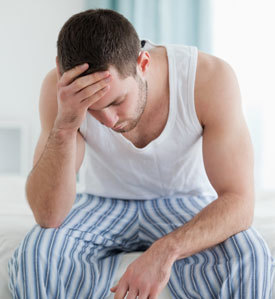
Prostatitis (lat. Prostatitis) , inflammation (swelling) of the prostate tissue.
The name of the disease derives from the word "prostata" (the prostate gland) + "itis" (inflammation).
Prostate gland (prostate) is a male body therefore, the disease prostatitis refers to men's diseases. The prostate is a small glandular-muscular organ located in the pelvis below the bladder and in such a way that covers the initial part of the urethra (the urethra). When the prostate becomes inflamed, it constricts the urethra, thereby creating a male problem urination, which is the main symptom of the presence of men prostatitis. The photo is a good example:
The role of the prostate gland (prostate) – development of a special secret that mixes with the seminal fluid, supports the activity of sperm and their resistance to adverse conditions.
According to statistics, currently (2015), prostatitis hurts almost half of men all the Earth, mostly aged from 20 to 50 years.
The symptoms of prostatitis
Prostatitis in men is accompanied by a number of symptoms. Below we consider the main ones, as well as those that occur in acute and chronic prostatitis.
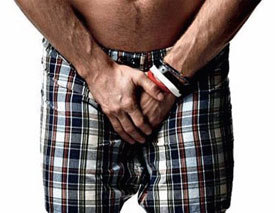
The main symptoms of prostatitis:
- urination disorder;
- pain in the lower abdomen, scrotum, perineum;
- sexual dysfunction (sexual dysfunction)
- problems with ejaculation;
- the change in the number and quality of ejaculate (sperm).
Symptoms of acute prostatitis (the First signs of prostatitis):
- the increase in body temperature to 39-40°C;
- headaches;
- chills, fever;
- muscle pain and lower back;
- pain in the joints;
- discomfort (swelling and excessive heat) in the crotch area;
- painful touching of the perineum;
- frequent urination with frequent urging;
- painful urination, burning when you urinate;
- turbidity of urine;
- blood in the urine;
- discharge from the urethra.
Symptoms of chronic prostatitis
Chronic prostatitis differs from acute prolonged and persistent course of the disease, often without clear clinical symptoms.
Chronic prostatitis symptoms:
- fever;
- pain between the scrotum and anus;
- pain in the lower back;
- cystitis, especially recurring cystitis.
Complications of prostatitis
If the symptoms of prostatitis do not pay proper attention and not to consult a doctor can cause the following complications:
- the development of male infertility;
- vesiculitis (inflammation of seminal vesicles);
- epididymitis (inflammation of the testicles and their appendages);
- the transition of the disease from the acute form of chronic;
- the narrowing and scarring of the urethra;
- obstruction of the bladder with acute urinary retention, which requires surgical treatment;
- severe pain in the perineum;
- frequent cystitis;
- abscess (suppuration) of the prostate, which require surgery;
- pyelonephritis and other renal damage;
- sepsis.
The causes of prostatitis

Now let's look at the main causes of prostatitis.
- infections (sexually transmitted infections) chlamydia, herpes, Trichomonas, Ureaplasma, Mycoplasma, cytomegalovirus, gonococcus, the fungus Candida (also causing thrush), E. coli (Escherichia coli), enterococci and other can affect the urethra and be detected in prostate tissue;
- sedentary and sedentary lifestyle;
- poor circulation and lymph circulation in organs of small pelvis;
- prolonged sexual abstinence and coitus interruptus or artificial lengthening sexual intercourse;
- stress: mental and physical overload;
- frequent hypothermia;
- violation of the immune system;
- a deficiency of vitamins (avitaminosis) and trace elements;
- hormonal imbalance;
- a violation of allergic status.
Types of prostatitis
In accordance with the criteria of the American National Institute of Health (NIH USA) from 1995 there are four categories of prostatitis:
- Category I — Acute prostatitis;
- Category II — Chronic bacterial prostatitis;
- Category III — Chronic prostatitis / chronic pelvic pain syndrome (CP / CPPS):
- Category IIIa Chronic prostatitis / chronic pelvic pain syndrome with signs of inflammation;
- Category IIIb Chronic prostatitis / chronic pelvic pain syndrome without inflammation;
- Category IV — Asymptomatic (asymptomatic) chronic prostatitis.
Occasionally found also not mentioned in this classification chronic granulomatous prostatitis.
In turn, most of the professionals are distinguished:
In the course of the disease:
- acute prostatitis;
- chronic prostatitis;
Depending on the causes of the disease:
- bacterial prostatitis;
- non-bacterial prostatitis
In most cases (especially men under 40) note bacterial prostatitis.
Based on this, there are:
- acute bacterial prostatitis;
- chronic bacterial prostatitis;
- chronic abacterial prostatitis.
Diagnosis of prostatitis
The diagnosis of prostatitis is established by a physician after personal examination. On examination:
- is digital rectal examination of the prostate gland;
- the capture of prostate secretion;
- blood tests and urine tests;
- tests are taken for sexually transmitted infections;
- Ultrasonography (ultrasound examination) or TRUS (transrectal ultrasound);
- uroflowmetry, monitoring of the circadian rhythm of urination
- urine culture and prostatic secretions with the definition of sensitivity of flora to various antibiotics;
- prostate biopsy (if necessary).
In the diagnosis it is important to ensure that the symptoms are not caused by urethritis (inflammation of urethra) or other diseases that can lead to permanent infection of the bladder or kidneys.
Treatment of prostatitis
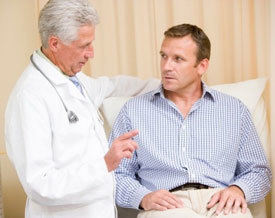
Treatment of prostatitis can be started only after establishing the exact type and form of the disease, which determines a further success in treatment, because treatment methods differ.
Patients with acute prostatitis with severe intoxication, fever, poor General condition in need of emergency hospitalization and intravenous antibiotics. Mild cases of acute prostatitis may be treated on an outpatient basis.
Treatment of prostatitis is conducted in the following ways:
Drug therapy
Antibiotics. Antibiotics are prescribed for bacterial (infection) prostatitis. If the cause of the disease are bacteria and viruses, antibiotics won't work. At the same time, antibiotics can cure almost all acute infections. The choice of antibiotics for acute prostatitis should be based on the results of determining the type of microorganism causing the infection and his individual sensitivity to antibiotics.
To relieve chronic pain in the perineum and pelvis prescribed alpha-adrenergic blockers and muscle relaxants.
Alpha-blockers and spasmolytics also relaxes muscles in the prostate and bladder, which helps to improve urine flow and reduce symptoms.
To remove the tension of the pelvic floor muscles to reduce compression of inflamed prostate and reduce pain can prescribe muscle-relaxing means.
Heavy patients assigned to intravenous fluids and diuretics, which causes copious urine, and as a result profilaktirujut intoxication of the organism, and the development of ascending urinary infection (cystitis, pyelonephritis).
For the relief of symptoms of non-bacterial prostatitis prescribe analgesics, antipyretics and anticholinergic drugs.
For constipation are recommended mitigating laxatives type of paraffin oil.
If in the treatment of acute bacterial prostatitis symptoms are gone completely, the treatment must go to the end, because symptoms may disappear before the complete disappearance of the infection from the body, and if the treatment is to stop acute bacterial prostatitis may become chronic.
Further assigned to supportive therapy.
Supportive therapy
Supportive therapy for prostatitis includes:
- peace;
- bed rest;
- drinking plenty of fluids (at least 8 glasses of water a day);
- warm sitz baths;
- soft seat as needed.
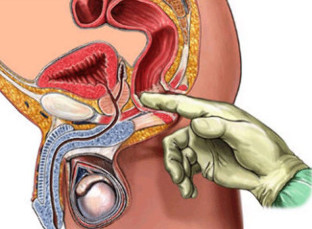
Prostate massage (prostate). In chronic prostatitis appointed regular massage of the prostate gland, which is the most effective remedy for prostatitis.
Diet. Some patients in the treatment of prostatitis is assigned to diet: exclude spicy and fatty foods, acidic drinks and caffeine.
Beneficial effects on treatment of prostatitis affects regular ejaculation, which can facilitate drainage of prostate secretions.
Patients with acute urinary retention shows the temporary imposition of suprapubic fistula, or intermittent bladder catheterization.
In the treatment of prostatitis should refrain from Cycling, often sitting on hard surfaces and hypothermia.
Surgery
Surgical treatment of prostatitis is assigned only in the case that the medical treatment methods have not led to desired results, and in the case when the prostate gland blocks the flow of urine. In addition, surgical intervention in this case is not intended for young people, because it can lead a man to infertility.
Surgery identifies the following methods of treatment of prostatitis:
Transurethral resection of the prostate – removal of all infected tissues.
Prostatectomy — surgery to remove the prostate, surrounding tissues, including seminal vesicles. This can lead to further impotence and incontinence of the patient.
Treatment of prostatitis folk remedies
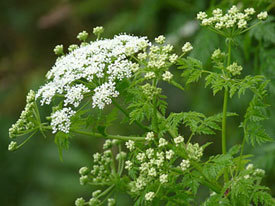
Treatment of prostatitis in the home folk remedies enables the patient to visit a doctor, but it is not always justified, because if the cause of inflammation of the prostate gland is infection cure on its own is unlikely to happen. However, from grandparents until we reached the following folk remedies for prostatitis:
Pumpkin seeds (white seeds). White seeds for prostatitis used even in ancient times, when the word "physician" is replaced with "quack". Pumpkin seeds have lots of zinc, which is necessary for any man to maintain the health of the male genitourinary system. For treatment is necessary just before meals a day to eat 30 seeds.
You can also use the following method: 500 g of roasted white seeds shell and loop on the grinder. Add 200 g of honey and mix thoroughly. Make of balls, size of a walnut. These balls must be taken 1 each 30 minutes before a meal, rassasyvaya 2-3 minutes, 1-2 times a day. To store the tool you need is in the fridge, but the reception for half an hour remove from the refrigerator, to room temperature.
The filbert (hazelnut). 1 tbsp. spoon leaves or bark of witch hazel brew in a Cup of boiling water (to close the Cup for 30 minutes with a tight lid). After that, the tool strain and take ¼ Cup 4 Aza a day. You can brew alternately, the bark, the leaves. The course is 1-2 weeks.
Aspen. In the second half of April, when the aspen tree SAP flow to the Bud and leaves of a tree collect the bark, the thickness of 3-5 mm. Then the bark is dried in the oven or in the shade. After drying, take 100 grams of bark, a little mash and put in half-liter jar. Bark pour 200 g of vodka, but so that it is completely covered with shredded bark. Put the lid on and leave to infuse in a dark place for 2 weeks. Further, the tool strain and take before meals 3 times a day by diluting 20 drops of tincture ¼ Cup of water.
Chestnut. Chestnut, like his shell copes not only with prostatitis, but the prostate cancer. To prepare a medicinal agent used the shell with the spines you want to brew and drink tea instead. Also this decoction can do microclysters, 250 ml, 2 times a week.
To prepare the means of the chestnuts, you peel, in a time when chestnut is brown in color. Peel, chop. 3 tbsp. chopped peel pour 600 g of boiling water at night. Then strain the tool and oparte it up to 200 g in a water bath. To use this tool you need on an empty stomach, 3 times daily 30 drops. The course of treatment is not yet completed remedy. Next you need to do 2 month break and repeat the course. Just to do 3 courses of treatment.
Propolis (bee glue). Propolis is used to treat chronic prostatitis, since this bee product is a powerful anti-inflammatory and antispasmodic agent. It can also be used in a complex with medicamentous treatment of prostatitis.
To prepare means you need 20 g of propolis to evaporate 200 ml of alcohol. After that, 0.1 g of the obtained money mixed with 2 g of cocoa butter. Of the funds received, make a candle, which you insert at night in the rectum. The course of treatment – 1 month, then a break for 4-6 weeks and repeat the course.
Candles from the test. To prepare a medicinal candles from prostatitis from the test, you need 3 tablespoons of rye flour add a teaspoon of honey and eggs. Mix all the ingredients and make this test a thin candle, not more than 1 cm in diameter. Sculpted candles freeze in the freezer. Frozen candles to insert in the anus in the morning and evening, preferably after stool. The course of treatment is 4 weeks, a week break and again 4 weeks.
Parsley. Parsley is a wonderful healing herb, rich in vitamins and minerals, reduces inflammation of the prostate and restores sexual functions of the body.
For treatment of prostatitis parsley, you need juice take 1 tbsp. spoon 3 times a day half an hour before meals. For these purposes, you can apply and parsley seeds that need to be crushed into powder. 4 teaspoons of powder pour 1 Cup of boiling water and put a medium boil for another 15 minutes, then let cool. Make the broth 1 tbsp. spoon 4-6 times a day.
Celandine and Hemlock (Hemlock is a poisonous herb). Half a tablespoon each of herbs pour 100 g of alcohol. Tool allow to stand in a dark place for 10 days. The infusion strain and drink every morning for half an hour before meals. For this purpose, in a glass of water on the first day add 1 drop of tincture, on the second day, 2 drops, 3rd – 3, and so on to 30 days (drops). Continue to count down in reverse order to the reduction. The full course is 60 days.
The juice from asparagus. For treatment of prostatitis is great, the asparagus juice with beet, carrot and cucumber juices. For the desired result, a day you need to drink at least 600 ml of juice.
Experts also say that if the juice from asparagus to You very unpleasant and you can not drink, do not force yourself and refrain from this tool.
Juice from berries of black elderberry. After sleep, drink a glass of water. Then, after 15 minutes, drink 1 tablespoon of elderberry juice. To drink the product before meals. Minimum course of treatment – 10 days. A side effect may be an increase in body temperature that will signal the start of the process of healing from prostatitis.
Prevention of prostatitis
To prevent the emergence of prostatitis, you must follow these expert recommendations:
- to refrain from promiscuous;
- to refuse to accept alcoholic beverages, Smoking and drugs;
- eat foods rich in vitamins and avoid junk food;
- to support the immune system at the proper level;
- to avoid hypothermia;
- exercise or physical therapy;
- not to prolong the sexual act;
- avoid prolonged arousal without ejaculation ended.























